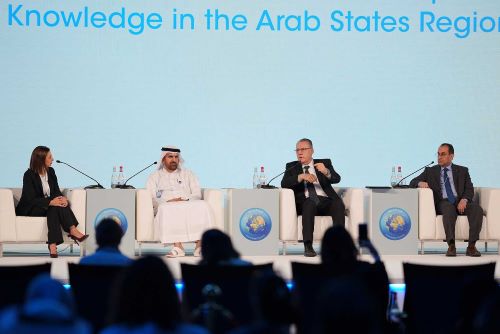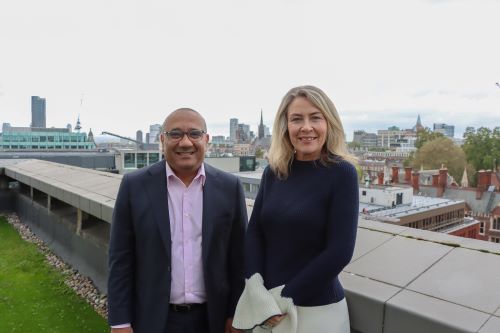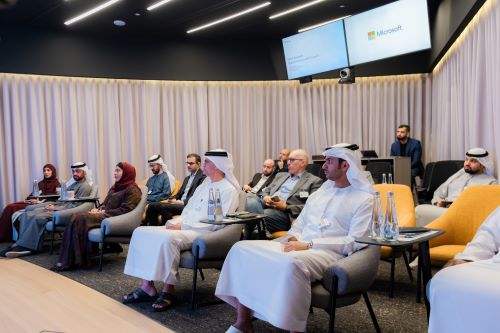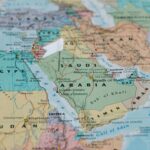Global Knowledge Index 2024 Results: UAE leads Arab knowledge landscape

The Mohammed bin Rashid Al Maktoum Knowledge Foundation (MBRF) and the United Nations Development Programme (UNDP) announced the results of the ‘Global Knowledge Index 2024’ (GKI 2024), an unparalleled global reference tool for assessing nations’ notable accomplishments in the knowledge domain.
The results were announced during a panel discussion titled ‘UNDP and MBRF Partnership – Advancing Knowledge in the Arab States Region and Beyond,’ organized as a part of Knowledge Summit 2024, held at the Dubai World Trade Center (DWTC) from 18 to 19 November.
Dignitaries including His Excellency Dr. Abdallah Al Dardari, UN Assistant Secretary-General, and UNDP Assistant Administrator and Director of the Regional Bureau for Arab States; His Excellency Jamal bin Huwaireb, CEO of MBRF; and Dr. Hany Torky, Chief Technical Adviser and Project Manager, Knowledge Project – UNDP, participated in the session moderated by Mayssoun Noueihed, Senior News Anchor, Al Arabiya.
H.E. Dr. Abdallah Al Dardari UN Assistant Secretary-General, and UNDP Assistant Administrator and Director of the Regional Bureau for Arab, highlighted the necessity for governments to recognize the importance of freedom of information and the need to provide it while also offering young people the opportunity to access knowledge from diverse sources. He pointed out that our future depends on young people’s capability to express themselves creatively and become the cornerstone of a knowledge economy.
H.E. Dr. Al Dardari said: “The Global Knowledge Index is a vital tool for economic planning in countries worldwide. Through the Future Skills initiative, the Future Skills Academy, and the Global Alliance for Skills, we aim to create genuine hope for the countries in the region as they strive to establish knowledge societies by bridging gaps in the realm of skills and education. Learning and acquiring knowledge must serve as a constant motivation for young people, as it is an inexhaustible source and a pivotal tool for developing our communities and improving living conditions.”
His Excellency Jamal bin Huwaireb, CEO of MBRF, said, “We are delighted to see that the UAE has earned a significant ranking in the GKI, which is a potent tool for nations to assess and improve their national policies and decision-making framework. The GKI meticulously reviews diverse indicators across scientific, research, and structural domains, leveraging rigorous analysis methods and scientifically validated data. It empowers government bodies by providing the right tools to identify opportunities, design robust strategies, enhance innovation, and drive comprehensive development. This year’s GKI shows that many nations, particularly those in the Arab region, have achieved several key knowledge milestones while underscoring the need for advancing education, research, and innovation strategies in many other parts of the world.”
Dr. Hani Torky, Chief Technical Adviser and Project Manager, Knowledge Project – UNDP, presented a comprehensive overview of the results of the Global Knowledge Index 2024. He discussed the key achievements of certain countries and the knowledge areas that require further attention in order to enhance their ranking on the index.
Dr. Torky explained that the Future Skills Academy is a developmental step for the Future Skills initiative. As the educational and training opportunities expand, the initiative takes on new dimensions through which it is linked with educational institutions and universities. He pointed out that we should not fear AI, as it will not replace humans; rather, it will enable institutions and individuals to gain a genuine competitive advantage, emphasizing the need to harness AI for the benefit of humanity.
This year’s index covers 141 countries, which is nearly three-quarters of the globe, with eight new additions. The GKI offers a panoptic perspective of the global knowledge landscape and serves as a powerful benchmarking tool in the domains of education, technology, research, and development. It also sheds light on each nation’s strengths, enabling them to address both local and international challenges in these fields.
Sweden secured the leading position with an index value of 68.3, narrowly surpassing Finland, ranking second with a score of 68.2, and Switzerland ranking third at 67.9. The fourth position was shared by Denmark and the Netherlands, each scoring 66.8. Apart from the United States, which came in seventh with 66.2, the top ten rankings were dominated by European nations
The GKI assessed 11 Arab nations, with the UAE topping the list in the Arab world and ranking 26th globally with an index value of 60.9. Qatar closely followed, placing 39th globally with a score of 55.5, while Saudi Arabia ranked third in the Arab world and 41st globally with a score of 54.8. Oman ranked fourth in the Arab world and 55th globally with a score of 50.0. Whereas, Lebanon, which was recently added to the GKI, ranked fifth in the Arab world and 81st globally with a score of 45.4.
Ten African countries ranked the lowest, with Niger in second-to-last place at 140th position with a score of 25.8, and Chad in the last position at 141 with a score of 23.4.
The 2024 GKI successfully showcases the exemplary achievements of Arab nations in the knowledge domain, across several key sectoral indicators. Remarkably, in the pre-university education sector, Saudi Arabia ranked 4th globally, with the average score for Arab countries in this field reaching 64.1, which is higher than the global average of 61.9. Similarly, in the Information and Communication Technology (ICT) sector, Arab countries scored an average of 49.5, outperforming the global average of 48.2. Globally, the UAE ranked 4th, and Saudi Arabia ranked 7th globally, underscoring both nations’ enduring efforts to bolster their technological infrastructure and enhance the integration of modern technology in development strategies.
Within the economy sub-sector, the UAE was listed among the top ten countries worldwide, based on factors like economic competitiveness, economic openness, finance, and local value addition. Moreover, Arab countries’ performance in the research, development, and innovation domain was on par with the global average of 31.5 points.
The GKI 2024 also underscored the consistent growth of certain Arab countries, especially the UAE, Saudi Arabia, and Qatar, in critical sectors such as education, technology, and the economy. The index further highlighted the urgent need to bolster these domains in certain Arab nations, particularly Palestine, Morocco, and Mauritania.
The GKI enables countries to accurately assess their knowledge and development landscape, identifying strengths as well as opportunities for improvement. The forthcoming edition of the index will incorporate new components to address emerging technologies and global transformations, ensuring a multi-dimensional portrayal of each region’s state of knowledge and development globally, serving as a trusted scientific reference and guide for advancement.
Last Updated on 4 months by News Desk 1













